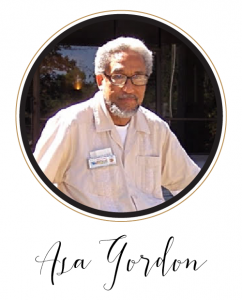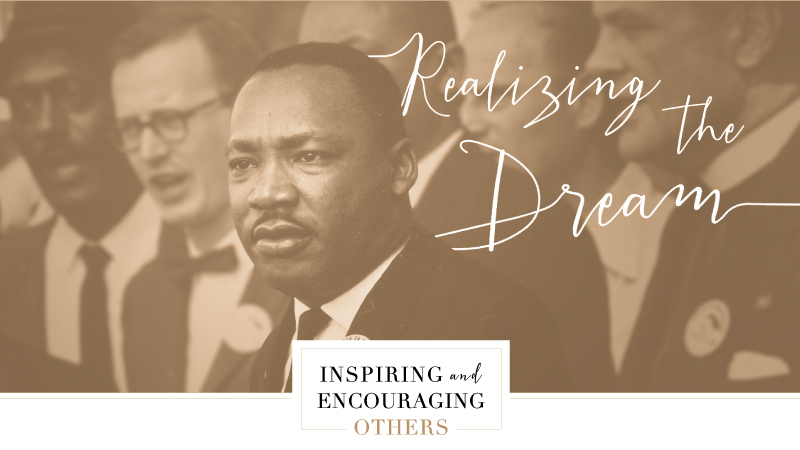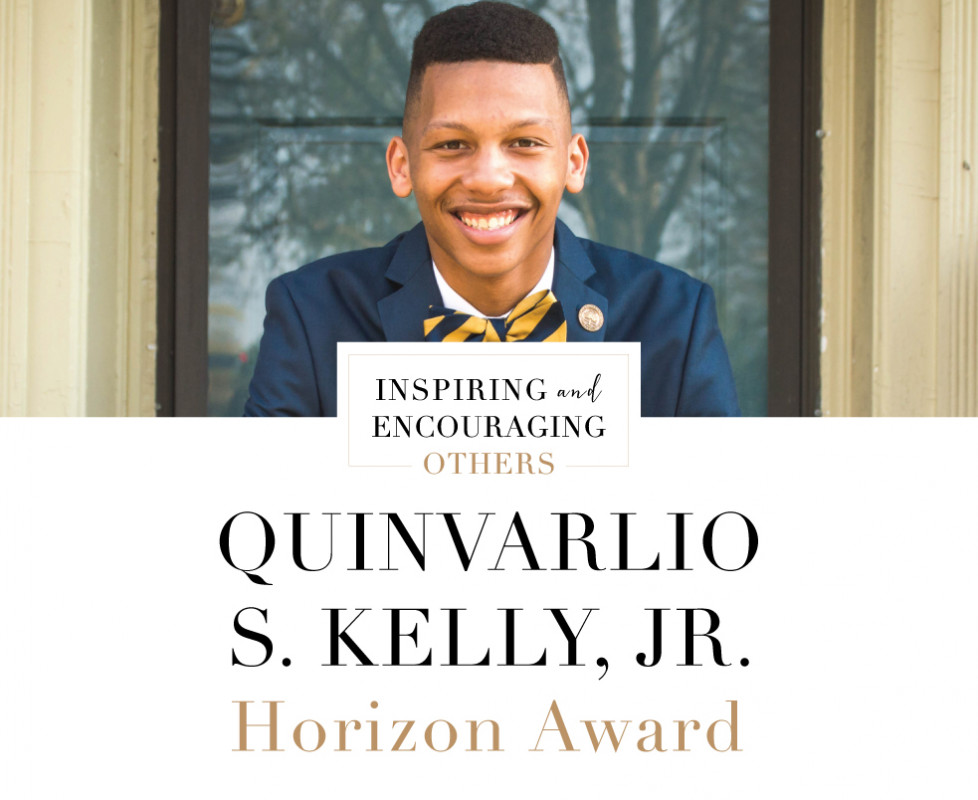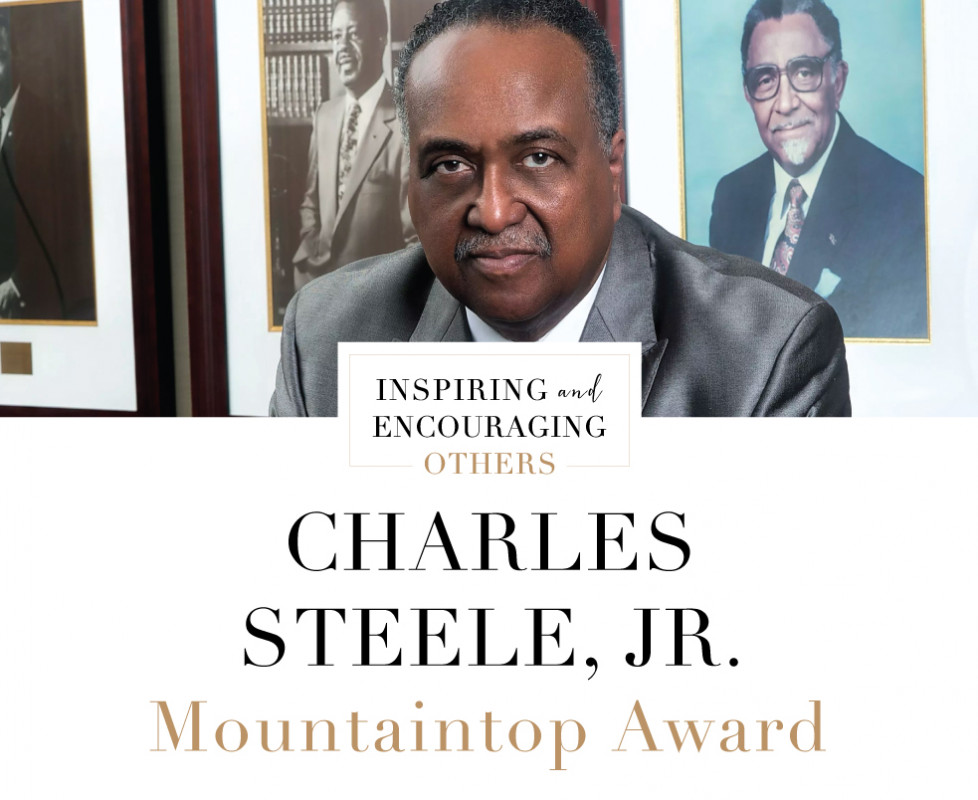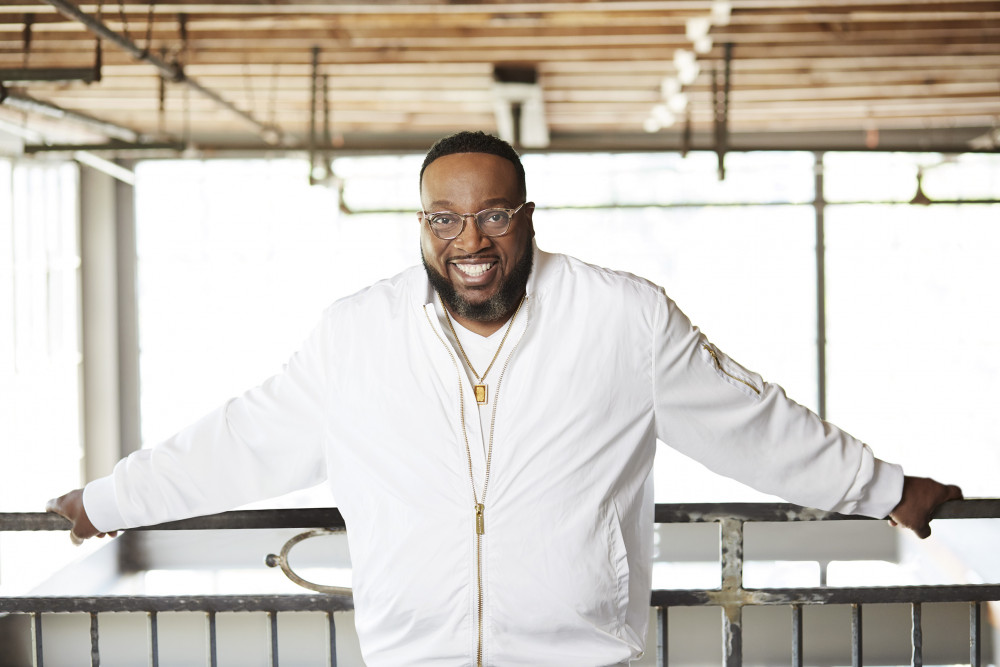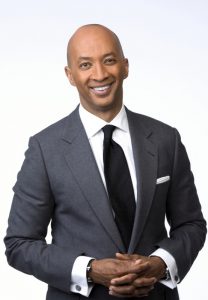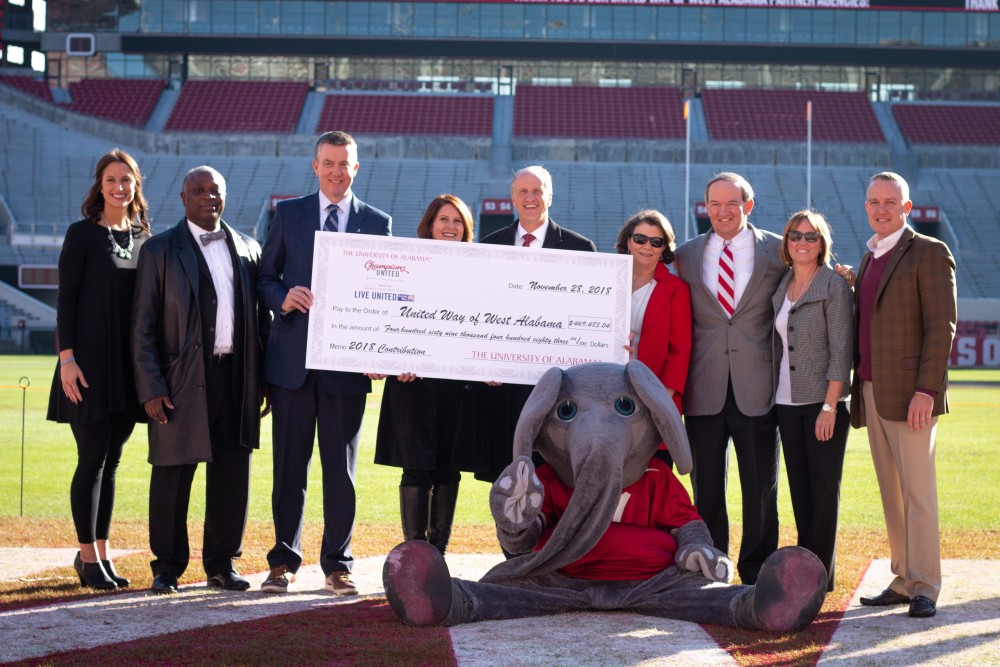(Editor’s note: In a speech punctuated by frequent applause, “amens” and other expressions of appreciation, journalist Byron Pitts kept the 2019 Legacy Banquet audience involved throughout. And although he brought some scribbled notes with him to the podium, he referred to them just once. Dr. Edward Mullins, who has introduced every speaker in the series, said, “It was the most inspiring Legacy Banquet speech I’ve heard.”)
I am honored to be here with you all tonight. We are here to celebrate Dr. King’s legacy and his dream for all of us — the importance of service. We are here to honor three distinguished members of this community and this is their night. So, if you don’t mind, I’m going to ask if they would stand along with their families. Quinvarlio Kelly is here with his family. Steven Anderson, would you stand with your wonderful family? And Dr. Charles Steele Jr., if he could stand. He’s here with his bride.
As we honor these three champions, these three wonderful men, I think it’s important that we acknowledge their loved ones. Because all of us who’ve achieved any measure of success know you don’t get there by yourself. It takes the support and prayers of a lot of people to get you where you want to be. In my case, it also sometimes required some cussing me out. I would imagine maybe somewhere in some of their pasts there may have been some of those encouraging words for them to move forward.
I won’t keep you long. For the record, you need to know I am Baptist, and so I am more inclined to sit down faster if I hear an “amen” every now and again. If not, then the Pentecostal tradition in me may come out, and I will be here for a while. My family is from the South. I live in New York now, so I am always grateful for opportunities to come back to the South to talk to folk. I am thrilled to be here in this wonderful community. I have to say I am a bit intimidated. Sometimes I talk about my prowess as a football player. I played Division III football. I’m in Tuscaloosa the birthplace of football, so I can’t at all talk about that.
And based on Dr. Mullins’ wonderful introduction, you would think I’m a pretty good speaker. But I’m in Alabama. Some of the greatest orators in American history were born in this state. Some of the most dynamic churches in all of America are in this community. So anything I might say, folk here have heard better just last week. So it’s a little intimidating.
As you know I am a professional journalist. One other observation before I go on. I noticed that when Dr. Mullins said that I had six kids, I heard some grunts from the audience. Six kids, is he Catholic? Six kids? Let the record show I travel a lot, but I get home sometimes. Oh, do we have any veterans in the room? I always like to acknowledge the veterans. Any veterans with us raise your hand. Thank you all for your service.
As a professional journalist for the past 37 years — for the students it just means I am old — and the last 20-plus years at the network level, I have covered three wars. I have interviewed the last seven presidents of the United States — in office or out of office. I have been to 97 countries, and at last count, I have watched 49 people die. I have watched as American service members gave their full measure to our great nation in places like Iraq and Afghanistan. I was in New York on Sept. 11, 2001 when about 2,300 of our fellow citizens died. Their only sin that day was simply showing up for work. I’ve covered two executions. I covered the execution of the man put to death in Virginia in the electric chair about the distance I am from this first table; and I was a witness to the execution of Timothy James McVeigh, a homegrown terrorist raised in a Christian household convicted of killing 168 men, women and children. So in many ways as a journalist I make my living covering death and I’ve made my peace with that.
But something that causes me unease is indifference: when good and decent people blessed with opportunity and access are indifferent to the concerns and needs of people around them, beyond their immediate family. My friends, life has taught me that indifference is a deadly weapon. So, the core of my message to you tonight, and this isn’t a new message, but it is reaffirming what all of us know, certainly what our three honorees know — the importance of service. I think it was Booker T. Washington who said “cast down your bucket where you stand.” All of us, where we stand right now in our space, whether you are a student, whether you are a retiree, wherever you are, you have the capacity right now to change the world, to change the world.
I believe that not just because of the profession I’ve been blessed to have, I believe that because of the life I’ve lived. You see, long before I was Byron Pitts of ABC “Nightline” and other places I’ve worked, I was a kid from east Baltimore, raised by a single parent. My mother had her first child when she was 17, and she had me before she finished high school. I didn’t learn to read until I was 12. I spoke with a stutter until I was 20, my junior year in college.
In elementary school, failing all classes, the school wanted to know: “Why is it that Byron can’t read?” So the school brought me in for a series of tests to try to figure out what the issues were. They called me in with my mom — Clarise Pitts is her name. I will reference her often in my remarks. God called her home about seven years ago, but I wear her cross with me so she is always with me, always present in my life. So, they called me and my mom in to give us these test results.
I’m a father, you heard earlier, and I know there are a number of loving, supportive, kind fathers here this evening with us. God bless them, but there is something special about mothers. Fathers? We will go to soccer practice when we are told. We will show up at a PTA meeting if we have to. But a mama, a loving mama, will kill a brick [do whatever it takes] for their child. So I know there are some brick-killing mamas in the house, and I was blessed with one. So, they call us in to give us the test results. And these are fancy folk, Dr. Mullins, people like you with initials in front of their names and some with initials on the back end of their names. These are important, powerful people — experts. They brought us in and said: “Ms. Pitts, we’ve run this series of tests on your son Byron, and it is our conclusion that your son Byron” — their words not mine — “your son Byron is mentally retarded.” {Gasps from the audience}. That was my mama’s reaction with some other words.
And so my mother said: “Test him again.” They said: “Ms. Pitts, didn’t you just hear what we said?” And she said: “Didn’t you hear what I just said?” My mother, God bless her, was a God-fearing woman. She could quote scripture with almost any minister in this town, but my mother could also have a conversation, a heated conversation, like any Marine you’ve ever met; if you know what I’m saying. So, she said: “Test him again.” And they said, “Okay, fine,” to humor my mother or at least to get us out of the office, “we’ll test him again.” So, they ran the tests again, and a few weeks later they brought us back — me and my mother — and they said: “Ms. Pitts, just as we thought, we ran the tests again and the results were the same. It is our expert opinion” — all of us have heard experts tell us different things in our life — “it is our expert opinion that your son” — their words not mine — “is mentally retarded and lacks the mental capacity to live a normal healthy life, and it is our recommendation, Ms. Pitts,” etc. At the time my mother was a woman of modest means and at that particular time with a 10th grade education raising three kids as a divorcee by herself. Now my mother knew the importance, the transformative power of education, and eventually as an adult learner she would go back — it took her nine years —and got her degree in sociology and spent the bulk of her professional life as a social worker, working with families much like her own.
But in that moment of crisis, she was a woman of limited means and limited education. So they actually said to this undereducated single parent, “Ms. Pitts because you lack the resources to help your child, our recommendation is to place him in an institution, and if not, all that we can recommend is that perhaps if you bring Byron back at 18” — I’m 10-and-a-half at the time — “if you bring him back at 12 perhaps there will be funding in the system.” My mother said: “If I wait till my child is 18 years old, my boy will be dead or in prison. He needs help right now.” But none was available.
But fortunately for me, what my mother lacked in formal education, the old folk would say, she made up with her knowledge of the world. You see, for much of her life my mother wore around her neck a small mustard seed encased in a clear plastic ball and chain around her neck. It was my mother’s daily reminder of the scripture in the book of Matthew that says if you have faith just the size of a mustard seed you can say to this mountain, “Move from here to there,” and nothing will be impossible. It is with my mother’s mountain-moving faith that she got me the help I needed and I’ve been able to live my dreams.
I am respectful of where I am. So, I don’t plan on going on talking about my faith, but you invited me here. There’s a popular saying, “Always dance with the one who brung you.” Young people, if you don’t know what that means, go to an older person and they will explain it to you. And so it is the faith that I learned at my mother’s knee that brought me to where I am. As was mentioned in the introduction by Dr. Mullins, I have written two books, my first book was called “Step Out on Nothing: How Faith and Family Helped Me Conquer Life’s Challenges.” And so, the title comes from a sermon in my home church, at the time in New Jersey. So those of us who grew up in church, particularly in the black church, you know that next to Christmas and Easter there is no grander holiday than Women’s Day (applause). So, it was Women’s Day at my home church, when sisters show up early, look good, smell better, many have on hats, gloves (laughter), certain generations. So anyway, this particular Women’s Day service we had a visiting minister — a woman, appropriate for Women’s Day.
And so she was giving the message that Sunday. She started talking about manicures, pedicures and women’s sore feet. I thought, my Lord, what time is it because there is nothing in this sermon for the brothers in church this morning. Then she said something that took my breath away. She said: “In those difficult moments — when your Rolodex, your résumé, your 401(k), who you know, your family last name, the amount of property you own — isn’t enough to get you past a difficult moment, for nonbelievers they would say you were stepping out on nothing. But for people of faith, you are stepping to that place where only God is.
And I thought that’s certainly my story, and I would imagine it is the story of many people here this evening. So, I wrote this book “Step Out on Nothing” and certainly a big portion of the book is about my mother and all the sacrifices she made for myself and my brother and sister. Now, not to paint too rosy a picture of my mother; someone asked her once how was she, as a single parent divorcee, how was she able to raise three kids by herself and send herself and her children to college. My mother said: “Oh, it was simple. I told each child you will go to college or I will beat you to death” (laughter). I’d imagine there are a few of us who had similar inspiration in school. Amen somebody? (“Amen!”) So, certainly all of us have examples of a parent, or two parents, or an auntie or uncle or a grandparent who stood in the gap for us. But life has taught me there are people who are not your relatives, who will step out for you.
I had this wonderful professor in college. Before I tell you how I met her, let me tell you a little bit about my academic background. As was mentioned, I didn’t learn to read until I was 12, spoke with a stutter until my junior year in college. I’ve never been a good student. For the record, Doc, I couldn’t have gotten into The University of Alabama. I couldn’t have gotten into the community college here in Tuscaloosa. I just couldn’t. I didn’t have the grades. In fact, I went to an all-boys’ Catholic high school in Baltimore. I like to say I had the best of both worlds — raised Baptist and educated Catholic (light applause). When I give that joke in Boston, people fall out of their chairs. In the South, it’s like … (louder applause).
So, I went to an all-boys’ Catholic high school, Archbishop Curley High School. In my freshman year I was ranked 445th out of 450 students, right. I knew that I had issues, but the brother at 446, 447, 448, my Lord (loud laughter).
My mother used to take us to church revival for three reasons: great childcare, free dinner, and it’s comforting in life to sometimes hear that somebody’s got it worse than you do. So, as bad as I was at 445, I knew there were five guys I was stronger than. But I finished 40th in my class when I graduated. Not the best student, but the best student I could be. And so the best school I could get into was Ohio Wesleyan University. And so, Doc, as I’m sure you see at your university and the professors who are here, oftentimes you will see students when they arrive, who are not fully prepared for the college experience, and that was certainly my case.
Freshman year, fall semester, I failed every class; not some, not most, every class. I failed with great distinction. A D- was as good as I did the first semester. My mother said: “Son, did you study at all?” So, I failed freshman English. Today, I am a professional journalist. Millions of people tune in every night to hear my interpretation of the day’s news. I failed freshman English. Perhaps it helps explain the challenges with journalism in America today (low laughter). That was a joke, y’all (louder laughter).
So, I failed freshman English. I held the record; I may still hold the record at Ohio Wesleyan. I was on academic probation longer than anyone who ever graduated from Ohio Wesleyan University. Now that I am on the board of trustees, today I have a title. So, I go home, my mother was a firm believer as I’m sure many of the parents here and the families that we represent. My mother was a firm believer there was nothing that prayer and hard work couldn’t overcome. My mother said: “Son, we’re just going to work harder and pray harder” (“Amens”). My mother would say: “Son, smart can think their problems away. We’ve got to wrestle ours to the ground. So, we’re going to wrestle this college thing to the ground until we get it right.” So at her direction, I go back to school the second semester in college and I take the same English professor, believing that if I just worked harder, prayed longer, I would do better.
“And this was the classic — if you looked in the dictionary for college professor you would see this guy — he wore suspenders with buttons on them, fancy sweaters year-round, it could be 90 degrees outside, pipe, preferred bowties to ties. You’ve seen the look: beard, glasses. So, I take him for the second semester. And Ohio Wesleyan is a small liberal arts college, about eight to twelve students in a class. So, this professor is passing out the midterms results and he gets to me and announces to the entire class, “Congratulations, Mr. Pitts. Best work thus far: D+. Come see me after.” “Yes sir.” Seventeen years old, raised to respect authority.
I followed him to his office. He said, “Mr. Pitts, don’t sit down. This won’t take long. He said “Mr. Pitts, based on my experience as a tenured” … Doctor, it took him 20 minutes to say tenured … “a tenured professor, I believe you are wasting my time and the government’s money. I think you should leave.” Again, I was a child raised to respect authority. If an adult spoke, I listened. If they gave a direction, that’s the way I went. So, I left his office and went next door to the admissions office to get the paper to withdraw from college and I began to cry. Now these weren’t Hollywood tears. These were shoulder-shaking, head-bobbing, nose-running tears. Anybody ever cry like that? I mean, I’m crying and I’m crying in part because I would imagine, like a number of people in this room, I was part of the first generation of my family to go to college. And so, if that’s your story, you know both the blessing and burden that can be; because you are carrying not just your hopes and dreams, but those of your family, perhaps the good folk at your church who prayed for you and invested in you. So, in that moment I felt like I was letting them down.
So, I’m crying and about this time a stranger walked by — true story. I didn’t know her. She didn’t know me. She simply said: “Young man, what’s wrong?” She sat down and listened to my sad story for about 20 minutes and she left. And so, when you’re crying the way I was crying, you can’t really hear. So, I didn’t really catch her name and I didn’t really hear where she said her office was, but I found her the next day. Come to find out this stranger was actually a professor at Ohio Wesleyan University, and not any professor. She was an English professor, and not any English professor. She was a first-year English professor. It was my first year at Ohio Wesleyan University. It was her first year there as well. Her name was Dr. Ula Lou from Estonia. Ula was born in Estonia, a country ravaged in World War II, first by the Russians, then by the Germans. She spent a good portion of her childhood in refugee camps in Eastern Europe. Eventually the Lutheran Church brought Ula and her family to Boston, Massachusetts. Please know that the Boston, Massachusetts of the early 1950s could be a difficult environment for a blue-eyed, blond-haired, white girl with an accent.
So, Ula knew something about struggle and disappointment and rejection. I like to say that Ula didn’t simply change my life; she saved my life. She stepped out on nothing for me and that is part of the story of the three men we honor tonight, who in the course of achieving things professionally and academically, that they took the time to step out to serve other people.
Life has taught me we can serve no matter where we are. Sometime in life we believe that the service only requires serving someone beneath us or someone less than, but that’s not true. My best friend from college was a guy named Peter Holt form Minnetonka, Minnesota. It’s fair to say, I had never met anyone from Minnetonka, Minnesota, and he had never met anyone from east Baltimore.
So Pete … for students who are here this evening, know that anything that you’re experiencing those of us of a certain age have experienced the same thing; anything you think you’ve gotten away with, trust me, many of us have gotten away with far worse during college. So, my freshman year in college, we would stay up late at night eating cold pizza and drinking our favorite beverage, which for me has always been sweet tea, solving the world’s problems. One night we’re up late and we’re talking; and Pete, from Minnetonka, said: “Yo, Baby Boy.” Now Pete and I were not relatives, but I think Pete thought that’s the way a white dude from Minnesota would talk to a black dude from Baltimore. He said “Baby Boy” with a Minnesota accent, a Minnesota gangster kind of accent. He said “Baby Boy, why do you struggle so with language. You use the wrong words. You stumble a lot when you speak, and I see your face in books. Then I see the test results. So, what’s the problem?” My initial instinct was to slap him, right? Because he was calling me out. Sometimes the truth can be difficult to hear, and so I explained to Pete my issues academically, that I was a poor student because of my issues with literacy. I had only read one book for enjoyment by the time I went to college. When I got to Ohio Wesleyan as a freshman I was reading at about a 10th grade level. So, I explained to Pete my situation. Pete was a botany major. Pete said, “Okay, Baby Boy, here’s what we’re going to do every day for the next four years. I’m going to give you a new word in the dictionary. You’re going to say it, spell it and use it in a sentence. Because when I graduate in four years, you are going to graduate with me.”
I was 17 years old. Pete was 18 years old. He had nothing to give me except access to his brilliant mind. He stepped out on nothing for me as a peer. So, in this room, where y’all look gorgeous by the way, think about the spaces in your life when you can be of service to someone. It could be someone who lives a more modest life than you. It could be a younger person, but it could also be a colleague, a peer, a neighbor, a sibling, and elder who you could step out for and make a difference for them.
As a person who’s in the word business, I know the power of language to lift someone or to injure someone. Growing up in my home church in Baltimore, one of the deacons in our church, James Mack, he used to see me and he’d say, “Hey, son. There are only two kinds of people in the world. There are champs and there are chumps. You look like a champ. So, I’m going to call you champ.” I can’t tell you as a young boy, raised by a single parent, with so few men in my life, what it meant to me to have this man that I respected to call me champ. Language is powerful. It gives each of us the opportunity to lift people around you. As I prepare to take my seat, I want to share with you an example of why I think service is important wherever you stand. If you are a student, you can serve. If you are retired, you can serve. If you are a professional (doing) busy demanding jobs, with a family, you can still serve however you choose to serve. And it’s vital.
Look, if you watch the news, my business, often you would think that America is falling apart. I don’t believe that. My travels around the world have shown me that for all of our many flaws, America is still the greatest country on earth (applause). The promise of America is unlike any place else on earth. We remain the envy of the world. People send their children here to be educated. Part of our DNA as Americans is that we serve, we volunteer. When I went to Haiti after the earthquake where 300,000 people died, some of the first responders were doctors from the United States. Hurricane Katrina in New Orleans, before FEMA got its act together, it was faith-based organizations, churches, volunteers from across the country, primarily from the South, who got there first to say “How can I serve?” I covered the tsunami in Indonesia where 250,000 people were killed. Some of the first responders there were American. Perhaps it is part of who we are to volunteer, to stand in the gap for other people in need. Certainly, we can do that in grand ways, in big ways. We’ve all heard about the Cajun Navy, in Louisiana, who responded to Hurricane Katrina and other disasters, right? I know this community was faced, not too long ago, with their own natural disaster (EF4 tornado, April 27, 2011) where people lost homes and families lost loved ones. And certainly the police played their role and the federal authorities, but it was community people who rallied around and loved on one another. So service is important. So, plant down your bucket where you stand. Serve. Find a way to serve where you are.
Here’s why it’s so important. I tell you a story about a young woman. She’s a friend of mine. None of you have met her, but all of you know her. So, several years ago, I was speaking to a middle school in Baltimore, a charter school, and usually when I speak to school kids, middle school and high school kids, the questions I usually get is “Do you know Jay Z? Have you ever interviewed Beyoncé? The answer is no I haven’t, no I haven’t. But to this particular school, I am talking about the importance of education. I was talking about the importance of working hard, being optimistic, something that I know all of us in this room value.
And so the kids are lined up afterward to shake my hand. I took some pictures and that kind of thing. You ever been somewhere sometime in public and you know someone is looking at you. It’s just vanity. You are in a public space, but you know someone is looking at you. I felt that. So, as I am done with my remarks and I am talking with kids, this beautiful little girl wanted to make sure she was the last person I spoke with in the crowd. She was about this tall (he gestures). Her name is Pilar. None of you have met her, but all of you know her. Pilar is a beautiful girl with coke-bottle glasses, thin. She said, “Mr. Pitts, thank you so much for coming back to Baltimore, your hometown; and thank you for talking about the importance of education and working hard and the importance of faith. But Mr. Pitts here’s my question. Mr. Pitts when you were my age, when you were 11 years old in Baltimore, where did you go, where did you hide, when the world hurt too much? My friends, no child in the most powerful country on earth should ever ask that question, but we know that they do.
A bit of her back story, she was 11 when I met her. Pilar’s mother was 16 years old, about a year older than my mother when she had my sister. So, when Pilar was 2, her mother, now 18 years old had a choice to make: her new boyfriend or her daughter, and she chose her boyfriend. So, from age 2 until she was about 7, Pilar would sleep on an auntie’s couch, a nice family from church, a teacher who knew her situation, a collection of people who helped take care of this child. At age 7 her fortunes changed a bit. Finally, the family services in Maryland recognize, discover this child in crisis and placed her in foster care. And this isn’t meant to be a criticism of the foster care system. Her foster mom was 81 years old, a diabetic who suffered from almost daily fainting spells. One could make the argument that at age 7, Pilar was as much taking care of this woman as this woman was taking care of this child. Pilar called her mama because as dysfunctional as it was, this is as close as she had to family.
A few years later, Pilar is 10. Her fortunes change again. Perhaps for financial reasons, perhaps because of the size of her heart, Pilar’s now 84-year-old foster mother takes in another child, a 17-year-old boy. His first night there, he wanders into her room and whispers into her ear: “You don’t matter. No one will care. No one will believe you.” She was 10. I met her about a year later. Where do you go and where do you hide when the world hurts too much?
Fortunately, for Pilar, this wonderful spirit that she is, there was a young teacher from the South, first teaching job, saw me talking to her. She said, “What did Pilar want, Mr. Pitts? She doesn’t talk to anybody.” And I shared Pilar’s question with the teacher, who had the same reaction that each of you had. And so she investigated. Eventually they removed the boy from that home. Now Pilar still slept in that same bed for years to come. I am happy to report now years later that Pilar is now a sophomore at Stevenson University in my home state of Maryland doing just fine. When Pilar got to high school, she went to the sister school of the high school I went to. You know, I pulled some strings. Whenever we can we do those kinds of things, we do it for our relatives. We should do it for other people as well.
So, we get Pilar into the school and she can’t participate in the extracurricular activities at the school because her neighborhood is so dangerous it would not be safe for her to go home alone after dark. She couldn’t participate in sports, academic things, the arts. One of my classmates from my high school now owns a limousine service. We arranged, he arranged, to have a Town Car take her home every single night. Just imagine the fellows in her neighborhood who are in the street pharmaceutical business would see this child come home every night in a Lincoln Town Car and go, “Dang! I don’t know who she rolling with, but we’re going to leave her alone.” So, Pilar and I we talk often and the last time I talked to her recently, she was complaining about math in college and I started laughing. She said, “Mr. Pitts why are you laughing. College math is hard.” I said, “Baby it is. It’s supposed to be. But how good is God that at this stage of life math is your biggest problem?”
My friends, I would imagine there are some Pilars in Tuscaloosa. I would imagine there are some children in this community who will fade away to sleep tonight asking that question: “Where do I go. Where do I hide, when the world hurts too much?” And it seems to me people in this room need to be there to answer that question. You know, as a journalist I, forgive me, I judge people. I do. I make snap judgments like that. In part because when you go places as I do for work, like Afghanistan or Iraq or Pakistan, Somalia, I have to look someone in the eye who says “yes sir, it’s safe for you and your team to go down this road. Yes sir, there are no land mines on that road.” So, I have to make snap judgments about people because there have been occasions where my life and the life of my colleagues is at stake. So, I judge people.
When I walked in here this evening, I judged each of you. I did. Now an early observation: You all look good. It’s important. Who was the comedian who said, “It’s better to look good than to feel good?” But after that, I sort of divided you into two groups, if you will. So, it was my assessment, my years as a trained observer as a journalist, I determined that about half the room I will call you all children of privilege. Right, I mean there are some people in this room who are the fourth, fifth, sixth generation in their family to be college-educated. Who have lived comfortable lives their entire life; that when they were born, there was an expectation of achievement. It seems to me that those of you who are children of privilege have a responsibility in this community to find Pilar, that child, that senior, and say, “Look life can be comfortable.”
There is no reason to be embarrassed or ashamed if you live a comfortable life and you’ve been blessed with opportunity your entire life. You can go, you can find Pilar and say, “Baby, life can be comfortable and I’m here to help you because I believe in helping other people.” It is biblical; it is how I was raised. So, children of privilege, you have work to do.
Now the other half of the room, I placed y’all in a different category. I call y’all children of the storm. I’d imagine in this room there are a number of people who were the first in your family to go to college. I imagine there are people in this room who were told countless times “not now, not yet, you’re not good enough, you’re not ready.” I imagine there are some business owners here, bank wouldn’t give you a loan. You had to scratch to grow your business to where it is now. I imagine there are some folk here who did not have the opportunity to go to college, but are finding a way now for their children, their grandchildren to go to college. It seems to me, my friend, that you have the unique responsibility to find the Pilar in your life, to go to her or him and say, “Baby, you can make it, because I’ve made it. I’ve been blessed in my life. Let me share my blessings with you.”
I am where I am not solely because of my hard work, but because people invested in me. That, my friends, is part of Dr. King’s dream, you know. I think about things. I was doing some research earlier that in Alabama the average cost of college statewide in Alabama — I have it written down. I’m a journalist. I believe in facts. — the average cost of college in Alabama is $6,116. Let me give you another number: $14,780. That’s the average cost of prison in Alabama for a year. You can send a kid to college for $6,000, or you can send him to prison for $14,000.
Now I’m not an accountant, but it seems to me for the accountants and the business owners in the room it makes more economic sense to provide education for children. It was Frederick Douglass who said, “It is far easier to raise a strong boy than it is to heal a broken man.” It is far easier to raise a strong boy than it is to heal a broken man.
So, my friends, whether you are children of privilege, or children of the storm, I challenge you in this season as we honor three great men this evening and we think about the legacy of Dr. King and all the men and women of that era, that you find a way to be of service. That you find your Pilar and you hold his or her little face and when they ask “where do you go, where do you hide, when the world hurts too much,” you be the one to say come to me. God bless. Thank you so much.
(Standing ovation.)


